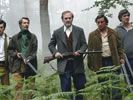Eye For Film >> Movies >> The Backwoods (2006) Film Review
"We're in the middle of nowhere," says Norman (Paddy Considine) to his wife Lucy (Virginie Ledoyen).
What he means is that they are in an isolated part of Northern Spain, with neither one of them equipped physically, culturally or, indeed, linguistically to cope with the sticky predicament fate has tossed them - but he might just as well be talking about their own relationship, also stuck somewhere out in nowheresville and long beleaguered by internal as much as external forces.

It is a double dynamic that can be seen at work throughout Koldo Serra's feature debut. The plot, on the one hand, in which a party of urban characters finds its civilised values tested to the very limits by some unfriendly rustics, is an obvious homage to Seventies classics such as John Boorman's Deliverance, Sam Peckinpah's Straw Dogs, or even Wes Craven's The Hills Have Eyes - and as though to hammer the comparison home, Serra sets his action explicitly in 1978 (and has the males in his cast sport a range of nifty sideburns).
Yet on the other hand, from the lyrics of Leonard Cohen's There Is A War (with which the film opens) onwards, the viewer is always aware that the 'savage revenge' storyline conceals any number of broader tensions - social, sexual and racial - within the main characters' lives, and it is this which transforms the film's otherwise generic materials into a psychological allegory of unexpected depth.
Norman and Lucy have joined Norman's former boss Paul (Gary Oldman) and Paul's Spanish wife Isabel (Aitana Sánchez-Gijón) for a vacation at Paul's remote farmhouse in a backwoods region of the Basque country. Norman's hope is to get his troubled marriage back on track in this new environment, but Paul has other ideas, and so, while their wives skinny-dip in the lake - and someone watches unseen from the trees - he takes Norman out on a hunting trip where the quarry is not just wild rabbits, but some misguided Nietszchean notion of nature and masculinity.
At an abandoned cabin, the two men chance upon a girl (Yaiza Esteve) with deformed hands, who has been locked away like a wild animal. They decide to bring the terrified girl back to Paul's farmhouse, and to go to the police for help - but civilisation is a long way away, and with four armed Spanish hillbillies out looking for the missing girl, things quickly go from bad to worse, as mistakes are made, crimes are committed, and Norman discovers his own heart of darkness.
"There are hunters and prey, Norman. That's the only fucking truth in this world." Paul tells him early on - but as the film's violence spirals further and further out of control, the distinction between hunter and prey becomes wildly confused. Norman and his bearded antagonist Paco (Lluís Homar) may each come from a different background, culture and class, and do not even speak the same language, but in their deadly game of tit-for-tat, their similarities prove far more compelling than their differences. Their common problem, the film suggests, is not so much the particularities of their situation as an altogether more general crisis of masculinity, where deep-seated shame, errant fatherhood and repressed rage mean that a man's gotta do what in fact a man does not have to do at all. By the end, it is not at all clear which of them has been the criminal, and which the victim, making Norman a distinctly unlikable would-be hero, and Paco an oddly sympathetic backwoods villain.
It is as though all the moral ambiguity and mean-spiritedness of 1970s cinema had never died. Add to this the consistently rock-solid performances and an atmosphere of moody menace, and you have a film that never fails to grip the attention, even if it is traversing territories that feel just a little overfamiliar.
Reviewed on: 05 Mar 2007



















